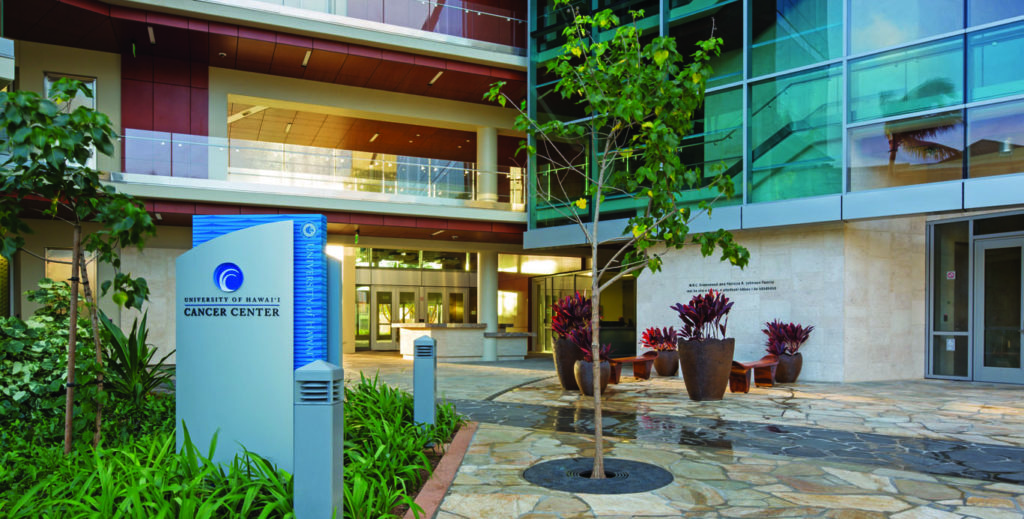Of the more than 1,000 cancer centers across the country, the University of Hawai‘i Cancer Center is again only one of 70 that is designated by the National Cancer Institute (NCI). The renewal, announced in July 2018, is an honor that the UH Cancer Center has held consecutively since first receiving NCI designation in 1996. Along with the designation, the UH Cancer Center was awarded a $6 million cancer center support grant by NCI to fund further research for three years.
The NCI-designated cancer centers are recognized for scientific leadership, resources, and the depth and breadth of research in basic, clinical, and/or population science. This designation enables the UH Cancer Center to continue is on-going mission to reduce the burden of cancer through research, education, patient care and community outreach. It also helps the center attract more faculty for its research.
“I am extremely pleased that the NCI has recognized the unique contributions of the UH Cancer Center and rewarded the efforts of our incredible faculty by continuing the NCI designation,” said UH Cancer Center Director Randall Holcombe. “For Hawai‘i and the Pacific, this means continued access to cutting-edge cancer treatments and the highest quality of cancer care through the only NCI-designated center in the Pacific.”
To receive NCI-designation, a cancer center must go through a rigorous and competitive process every three to five years, which includes an in-depth review of previous grants, programs, shared resources, community outreach and education. “During the grant review process, NCI noted that the community outreach and engagement by the UH Cancer Center was exceptional, with a profound impact on the populations in Hawai‘i and across the Pacific,” added Holcombe.
The designation has allowed UH Cancer Center researchers to bring in an average of $40 million per year in grants from the National Institutes of Health and other related agencies to support ongoing cancer research. Over the past five years, more than 1,600 people have participated in UH Cancer Center-sponsored clinical research studies, with topics ranging from how diet and the environment may influence the development of cancer, to novel treatment interventions for patients with advanced cancer. “The National Cancer Institute’s renewal of our designation provided a well-deserved external validation and national recognition of the important work being done by the UH Cancer Center now and into the future,” said UH President David Lassner. “Over the last few years, our Cancer Center has particularly excelled in novel discovery and in translating those discoveries into advances that will help cancer patients and those at risk from this debilitating disease.”

Key UH Cancer Center Studies and Discoveries
- The UH Cancer Center conducts the most ethnically diverse lifestyle and cancer prevention study in the world. The Multiethnic Cohort study conducted in conjunction with the University of Southern California involves 215,000 Hawai‘i and Los Angeles residents.
- UH Cancer Center researchers found that Japanese, Chinese and Koreans tend to have high amounts of abdominal fat, and this type of fat is more dangerous than others in terms of certain diseases and cancers. UH Cancer Center researchers are looking for ways to help prevent abdominal fat build up.
- UH Cancer Center researchers are studying ways to improve colon cancer screening and prevention for Native Hawaiian Men. Native Hawaiian men have one of the highest death rates from colon cancer of any ethnic group.
- UH Cancer Center researchers are studying the risks of e-cigarettes on teens and young adults.
- UH Cancer Center researchers study plants and other natural resources native to Hawai‘i to see if there are natural compounds that can be used to treat cancers. UH Cancer Center researchers discovered that the ironweed plant found mostly on the Hawai‘i Island may help fight aggressive types of breast and brain cancers.
- Seminal advances about genes that cause cancer syndromes, such as BAP1, and genes that drive metastases, such as RSK2, have been made by UH Cancer Center researchers.
- The UH Cancer Center’s Hawai‘i Tumor Registry has provided incidence and survival data on all cases of cancer in Hawai‘i since 1973, and is a part of the national Surveillance, Epidemiology, and End Results (SEER) Program.

